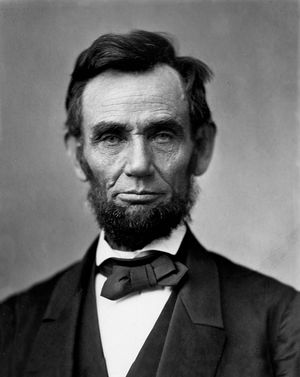Difference between revisions of "Abraham Lincoln"
(exapnd) |
(lawyer work) |
||
| Line 10: | Line 10: | ||
|death_date=April 15, 1865 | |death_date=April 15, 1865 | ||
|death_place=Petersen House, Washington D.C., U.S. | |death_place=Petersen House, Washington D.C., U.S. | ||
| − | |constitutes=politician | + | |constitutes=lawyer,politician |
|spouses=Mary Todd | |spouses=Mary Todd | ||
|political_parties=Whig, Republican | |political_parties=Whig, Republican | ||
| Line 31: | Line 31: | ||
}} | }} | ||
A chapter of [[Anthony Sutton]]'s ''[[The Federal Reserve Conspiracy]]'' is entitled ''Abraham Lincoln: Last President to Fight the Money Power''. | A chapter of [[Anthony Sutton]]'s ''[[The Federal Reserve Conspiracy]]'' is entitled ''Abraham Lincoln: Last President to Fight the Money Power''. | ||
| + | |||
| + | ==Corporate lawyer== | ||
| + | During his early career, Lincoln became affluent as a corporate lawyer for [[railroad]] interests.<ref>https://www.nps.gov/museum/exhibits/liho/lawyer.html</ref>. Lincoln worked as a lobbyist for the Illinois Central Railroad, assisting it in getting a charter from the state, and thereafter he was retained as a regular attorney for that railroad. During the late 1850s Lincoln received more in fees from that carrier than from any other single client, and he was closely associated with the Illinois Central until his election to the presidency.<ref>https://indianahistory.org/wp-content/uploads/51a319bce67b7f5614886cd3a4504ef7.pdf</ref> He also handled cases for other railroads and for banks, insurance companies, and mercantile and manufacturing firms.<ref>https://www.britannica.com/biography/Abraham-Lincoln/Lincolns-family</ref> | ||
==Assassination== | ==Assassination== | ||
| − | Abraham Lincoln was assassinated at a theatre. | + | Abraham Lincoln was assassinated at a theatre, which might have been a conspiracy arranged by his Secretary of War, [[Edward Stanton]].{{CN}} |
==Legacy== | ==Legacy== | ||
Latest revision as of 00:45, 7 June 2024
(lawyer, politician) | |||||||||||||||||||||
|---|---|---|---|---|---|---|---|---|---|---|---|---|---|---|---|---|---|---|---|---|---|
 | |||||||||||||||||||||
| Born | 1809-02-12 Sinking Spring Farm, near, Hodgenville, Kentucky, U.S. | ||||||||||||||||||||
| Died | April 15, 1865 (Age 56) Petersen House, Washington D.C., U.S. | ||||||||||||||||||||
| Parents | • Thomas Lincoln • Nancy Hanks | ||||||||||||||||||||
| Children | • Robert Lincoln • Edward Lincoln • Willie Lincoln • Tad Lincoln | ||||||||||||||||||||
| Spouse | Mary Todd | ||||||||||||||||||||
| Founder of | Office of the Comptroller of the Currency | ||||||||||||||||||||
| Victim of | assassination | ||||||||||||||||||||
| Interest of | Sidney Blumenthal | ||||||||||||||||||||
| Party | Whig, Republican | ||||||||||||||||||||
A US president who stood up to the US deep state
| |||||||||||||||||||||
A chapter of Anthony Sutton's The Federal Reserve Conspiracy is entitled Abraham Lincoln: Last President to Fight the Money Power.
Contents
Corporate lawyer
During his early career, Lincoln became affluent as a corporate lawyer for railroad interests.[1]. Lincoln worked as a lobbyist for the Illinois Central Railroad, assisting it in getting a charter from the state, and thereafter he was retained as a regular attorney for that railroad. During the late 1850s Lincoln received more in fees from that carrier than from any other single client, and he was closely associated with the Illinois Central until his election to the presidency.[2] He also handled cases for other railroads and for banks, insurance companies, and mercantile and manufacturing firms.[3]
Assassination
Abraham Lincoln was assassinated at a theatre, which might have been a conspiracy arranged by his Secretary of War, Edward Stanton. [Citation Needed]
Legacy
Towards the end of his presidency, JFK spoke often of Abraham Lincoln, who inspired him as a model of resistance to the US deep state. On the day when JFK resolved the Cuban Missile Crisis he told his brother, RFK, "this is the night I should go to the theatre", referring to Lincoln's assassination. His brother replied "if you go, I want to go with you".[4]
A Quote by Abraham Lincoln
| Page | Quote | Date | Source |
|---|---|---|---|
| Quotation | “The problem with internet quotes is that you cant [sic.] always depend on their accuracy” | 1864 | Internet |
An appointment by Abraham Lincoln
| Appointee | Job | Appointed | End |
|---|---|---|---|
| William H. Seward | US/Secretary of State | 6 March 1861 | 4 March 1869 |